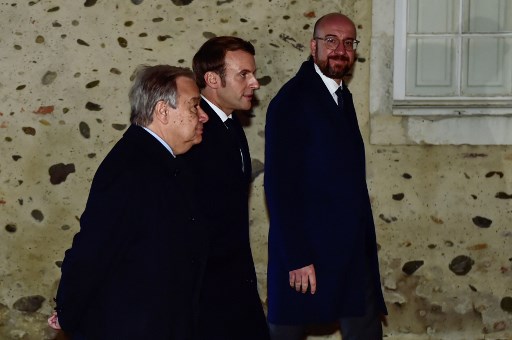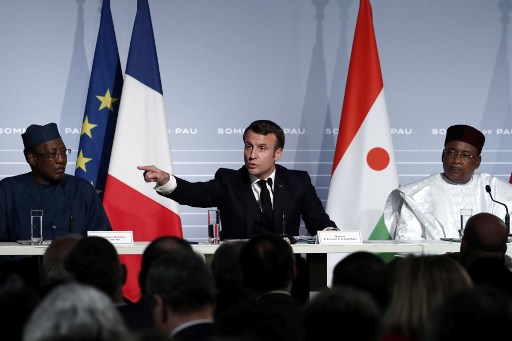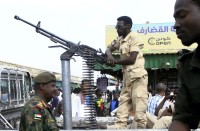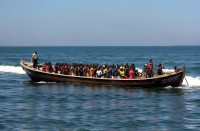
PAU, France (AFP) – Laurence Benhamou and Marie Wolfrom
France and its five partner nations in the Sahel region of West Africa pledged Monday to bolster their efforts against jihadists waging an increasingly deadly insurgency, while urging the United States to keep its troops engaged in the region’s anti-terror fight.
President Emmanuel Macron and the leaders of Mali, Burkina Faso, Niger, Mauritania and Chad lauded Washington’s “crucial support”, after a top US general confirmed the Pentagon was weighing a drastic troop reduction in Africa.
“If the Americans decided to leave Africa, this would be very bad news for us,” Macron said after the high-stakes summit meeting in Pau, southwest France.
“I hope to convince President Trump that the fight against terrorism is playing out in this region as well,” he said.
Macron said he would send 220 more soldiers to reinforce France’s 4,500-strong Barkhane operation, tasked with training and assisting under-equipped local forces, and called on other allies to step up their participation in a new “Sahel Coalition.”
“The heads of state… underscored the need for greater cooperation in implementing the current initiatives in the Sahel and a stronger international commitment,” the leaders said in a joint statement after the talks.
In particular a new “Takuba Task Force” consisting of European special forces will be set up to track down insurgents in the mostly lawless border area linking Mali, Niger and Burkina Faso.
No details were given on which countries might contribute, but the leaders said the Takuba forces would focus initially on fighters from the Islamic State in the Greater Sahara, known by its French abbreviation EIGS.
– ‘Terrorists gaining ground’ –
Despite the French presence and a 13,000-member UN peacekeeping force in Mali dubbed MINUSMA, the conflict that erupted in the north of that country in 2012 has since spread to its neighbours, especially Burkina Faso and Niger.
The Sahel fight has taken on greater urgency after a series of deadly attacks on military and civilian targets in recent months, underscoring the loss of government control of large swathes of a semi-desert region the size of Western Europe.
A brutal attack that killed dozens in Niger prompted Macron to call the summit with Mali’s Ibrahim Boubacar Keita, Burkina Faso’s Roch Marc Christian Kabore, Niger’s Mahamadou Issoufou, Mauritania’s Mohamed Ould Ghazouani and Chad’s Idriss Deby.

On Thursday, 89 soldiers were killed in an attack on a military camp at Chinegodar near Niger’s border with Mali, the worst jihadist attack in the country’s history.
UN chief Antonio Guterres, who was to attend a dinner with Macron and the G5 leaders, warned this month that “terrorist groups are gaining ground.”
The leaders warned in particular on the need to quickly resolve the civil war in Libya, “which continues to foster instability in the Sahel,” according to their statement.
They also called on allies to fulfil their pledges of financial aid to deal with a crisis that has seen thousands of civilians killed and more than a million displaced.
Last year, only $300 million (269 million euros) of $400 million pledged by the international community in cash and material support to the Sahel was delivered, according to the French presidency.
Across the region, schools and health clinics have been forced to shut because of the Islamist threat.
France and the G5 leaders said they would meet again in the Mauritanian capital of Nouakchott in June to evaluate their progress.
– ‘Shameful’ –
The summit came as France’s military presence, which began in Mali in 2012, is being questioned by many in the region who chafe at the increasingly prominent role played by a former colonial power.
On Friday, hundreds of people gathered in the Malian capital Bamako to protest the presence of the 4,500 soldiers in France’s Barkhane operation, carrying posters reading “Down with France, Barkhane must leave” and “France is a brake on our development”.
Such criticism had riled French officials, not least after 13 soldiers were killed in a helicopter collision in Mali last month while pursuing jihadist fighters, the deadliest toll for the French military in nearly four decades.
Macron denounced “foreign powers” for stirring up the anti-French sentiment, amid reports that Russian paramilitary fighters from the Wagner group were increasingly active in the Sahel.
“The statements I’ve heard these past weeks are shameful… because they serve other interests, either those of terrorist groups.. or foreign powers who want to push out Europeans because they have their own agenda — a mercenary agenda,” he said, without citing any particular groups.
© Agence France-Presse






